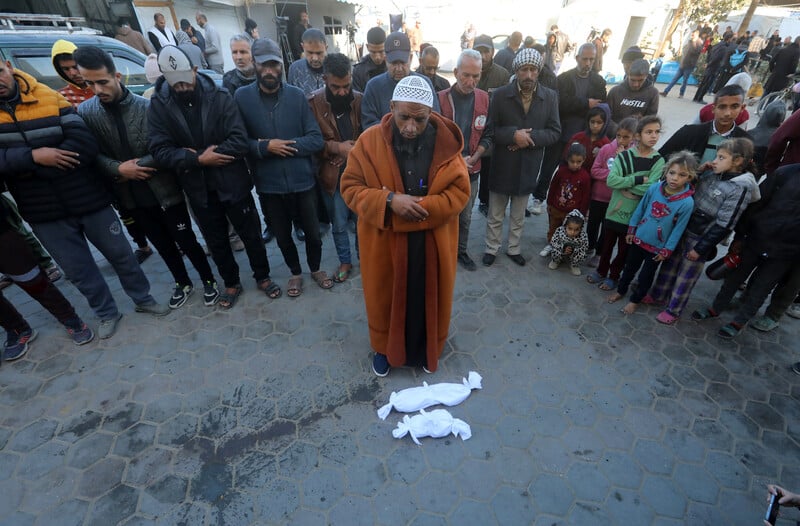-
Israel destroys Gaza hospital, abducts director Hussam Abu Safiya

Jumaa Batran, only one month old, died of hypothermia in a displacement camp. His body was brought to Al-Aqsa Hospital in Deir al-Balah for funeral rites, 29 December. ( APA images)
The following is from the news roundup during the 30 December livestream. Watch the entire episode here.
Since the beginning of October, we’ve been reporting every week on the relentless targeting of medical workers, patients and staff of the Kamal Adwan hospital in Beit Lahiya, as Israel accelerates its ethnic cleansing operations and complete obliteration of Palestinian life in north Gaza.
And for more than 80 days, the hospital’s director, a pediatrician named Dr. Hussam Abu Safiya, has pleaded with the world to stop Israel’s genocidal attacks on his hospital, his staff and his patients.
This past week, Israeli tanks and armed quadcopter drones continued to lay siege to the hospital, which was the only partially functioning medical center left in the north.
It now lies in ruins after the Israeli army stormed the building, forcibly ordered everyone inside to leave, interrogated and strip searched staff and set fire to the hospital.
Here are the developments from the last week of attacks on Kamal Adwan hospital.
Israel deployed remote-controlled vehicles to place boxes of explosives around the hospital, according to eyewitnesses.
Drones were filmed dropping bombs on the hospital itself.
On 24 December, Abu Safiya stated that “something new” was developing in terms of Israel’s attacks on the hospital.
“Explosive robots began to approach little by little, and two robots detonated near Kamal Adwan hospital,” he said.
“I believe they were around 50 meters from here. Unfortunately, these explosions as two robots were detonated resulted in massive damage to the hospital. This is the situation,” he said, as a bomb dropped by a quadcopter exploded nearby. “We get bombarded by these bombs all night long.”
On 25 December, Israeli attacks on Kamal Adwan killed 5 hospital workers: Dr. Ahmed Samour, a pediatrician; Israa Abu Zaida, a laboratory technician; two paramedics, Abdul Majeed Abu Al-Aish and Maher Al-Ajrami; and Fares Al-Hudali, a maintenance worker.
On 27 December, Israeli soldiers ordered patients and medical staff to leave the hospital. Some patients were transferred to other medical facilities.
Israeli forces also ordered the entire medical staff to strip off their clothes, march to a nearby area, and undergo interrogations before some of them were abducted and taken to unknown locations.
An eyewitness said that Israeli soldiers forced all the patients and displaced people to walk a long distance to a checkpoint, where they were subjected to hours of humiliation and invasive searches before being loaded into trucks, still without clothes, and left to sit for hours.
The eyewitness said that everyone; injured, sick, displaced, or visitors, received the same degrading treatment, with no regard for their conditions. Soldiers had also marked Palestinian captives with numbers on their necks and chests.
Shurouq Saleh Khader al-Rantisi, a lab worker at the hospital, told reporters that Israeli forces ordered the female hospital staff members to remove their shirts and pull down their pants. They also ordered the women to remove their headscarves.
“When we all completely refused to do so, they said that those under 20 years of age should take them off. We still all insisted that we would not take off the hijab.”
Al-Rantisi said that after searching them, the soldier checked IDs and made the group of female staff sit behind the detained men on a sandy bank.
“We were surprised to see that they [the Israeli forces] were burning the archives,” al-Rantisi said, adding that after that, the army called for Dr. Hussam Abu Safiya, and he went outside. He came back and told his staff that the army wanted everyone out of the hospital.
A physician in Gaza, Dr. Ezzideen, stated on social media that some of the medical staff “were later transferred to the Indonesian Hospital (a facility that had been cleared of displaced people a week ago).”
Hours later, he added, “a few of our colleagues were released from the Indonesian Hospital but were subjected to another round of searches before leaving. … Unfortunately, some of the medical staff, including the hospital director, were taken to an unknown location, and their fate remains uncertain.”
On Saturday, images emerged of Dr. Hussam Abu Safiya being ordered to walk toward two tanks outside of the hospital to talk to the soldiers inside the tanks. He was subsequently abducted and reportedly physically assaulted by the Israelis.
A nurse, Waleed Al-Boudi, gave his eyewitness testimony on Abu Safiya’s abduction and abuse by Israeli soldiers.
As of 30 December, Abu Safiya has been effectively disappeared by the Israeli army and his exact whereabouts are unknown.
There were reports that he was seen being beaten by Israeli soldiers.
The Gaza government media office stated on Sunday that “Dr. Hussam Abu Safiya, along with his colleagues in the health system, bore the burden of defending the right of patients and the wounded to receive treatment and medical care, and remained steadfast in the field of work despite his severe injury and the loss of his son Ibrahim, who witnessed the sacrifices of this steadfast family.”
The media office added that, if true, “the reports that Dr. Hussam Abu Safiya was subjected to serious violations and psychological and physical pressure after his arrest, including being forced to take off his clothes and medical coat and being used as a human shield, constitute a blatant violation of all human values and international conventions.”
Abu Safiya, as we have reported, had refused repeated orders by the Israeli army to abandon his hospital. In late October, Israel raided and besieged Kamal Adwan, killing Abu Safiya’s 15-year-old son, Ibrahim, in a drone strike.
The doctor led the funeral prayers for Ibrahim before burying him in the hospital’s courtyard. At the time, he accused the Israeli army of killing his son as a punishment for refusing to abandon the hospital and his staff and patients.
A month later, Abu Safiya was injured in another drone strike, shredding his leg with shrapnel and leaving him seriously wounded.
But he declared, “[t]his will not stop us. I was injured at my workplace, and that is an honor. My blood is no more precious than that of my colleagues or the people we serve. I will return to my patients as soon as I recover.”
Just last week, as our contributor Fedaa Al-Qedra reported, Abu Safiya insisted that transferring patients as called for through an Israeli loudspeaker would take days, not hours, if it was even possible. The Indonesian hospital in Beit Lahiya, he said, would have to be prepared and there was a lack of ambulances to transport patients.
“Once again, as on so many occasions in recent weeks, he appealed to an unlistening world,” Fedaa al-Qedra writes.
Attacks on other hospitals in northern Gaza
The Palestinian ministry of health in Gaza noted on Friday that “the only hospital [in northern Gaza] that was partially operational due to the lack of medical capabilities and supplies was Kamal Adwan Hospital,” after the Israeli military destroyed the other two public hospitals in the area.
“Beit Hanoun Hospital was completely destroyed, and the Indonesian Hospital is completely out of service after the destruction of all infrastructure.”
“What is happening today is that the occupation has dealt a fatal blow to the remaining health system in northern Gaza, and this is completely consistent with the ‘General’s Plan’ to end the presence of the population in the northern Gaza Strip,” the health ministry stated.
Israel attacked three other hospitals in northern Gaza this weekend, including al-Ahli Baptist hospital, al-Wafaa hospital in Gaza City, and Al-Awda hospital in Jabaliya.
Al-Mawasi attacked, five newborns die of hypothermia
Israel continues to repeatedly attack the tents of displaced Palestinians in so-called humanitarian safe zones in Gaza. On 22 December, Israel massacred at least seven Palestinians in a bombing of al-Mawasi, setting the tents ablaze.
And this week, at least five newborn babies have died from hypothermia in displacement camps including al-Mawasi. The oldest child, Jumaa Batran, was only one month old.
Al Jazeera’s Hani Mahmoud reported that “[t]housands of Palestinians displaced from their homes have been living inside nylon, plastic and makeshift tents along the coast and in the central area of the al-Mawasi evacuation zone, where it gets really cold at this time of the year.”
“The fear is this is going to worsen as weather forecasts warn of a cold front hitting the Gaza Strip in the coming days,” Mahmoud added.
The Palestinian ministry of health in Gaza announced that a physician, Ahmed Al-Zaharna, who worked at the European Gaza Hospital, also died from hypothermia on 27 December. His body was found inside his tent in al-Mawasi.
Five reporters burned alive in Israeli airstrike
Israel also killed five journalists this week in Gaza.
The Gaza government media office says that the number of reporters and media workers who have been killed since October 2023 now stands at 201, after Israel bombed the press van of the Al-Quds Al-Yom satellite channel at about 1:00am on 26 December, burning five reporters alive while they were working in Nuseirat refugee camp.
Their names were Faisal Abu Al-Qumsan, Ibrahim Al-Sheikh Ali, Muhammad Al-Ladah, Fadi Hassouna and Ayman Al-Jadi.
Al-Jadi’s wife was in labor at a nearby hospital with their first child when he was killed. The baby was born a few hours later and was named after his father.
The Palestinian Center for Human Rights called the missile strike on the media van “the worst crime against journalists in Israel’s genocide in Gaza.”
The group said that “Israel, by targeting journalists, aims to monopolize the narrative and orchestrate a media blackout to prevent the world from seeing the atrocities committed against the Palestinian people while denying international journalists’ access to Gaza to cover the genocide.”
Highlighting resilience
Finally, as we always do, we wanted to share images of people expressing defiance and resilience in the face of Israel’s campaign of destruction.
A celebration for a newborn baby in the Refaat Alareer camp for displaced families in Deir al-Balah was captured by the Sameer Project, a local mutual aid organization.
“Osbo’o” meaning week in Arabic is what we call the celebration of a newborn baby in Palestine. Aysal is the first newborn in the Refaat Alareer camp who was born in late November and we celebrated her arrival a week after she was born. We also celebrated Yazan and Maya’s… pic.twitter.com/5tovKZ5QPz
— The Sameer Project (@sameerproject) December 23, 2024








Login or Register to Leave a Comment